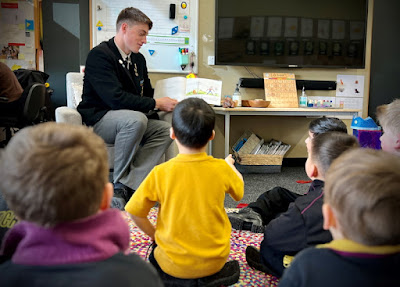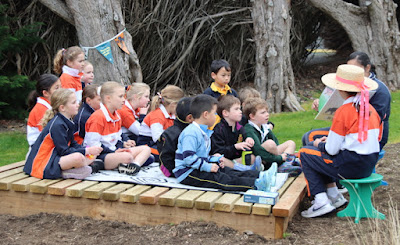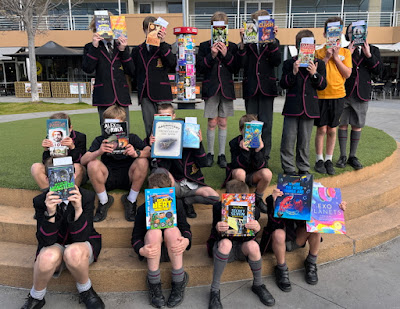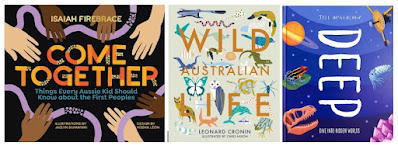Hutchins School engaged in a range of exciting activities in the lead up to, and then ongoing throughout Book Week. It is wonderful to see such a strong reading culture celebrated across the school.
Critical Evaluation of Shortlisted Titles (our version of Shadow Judging)
Our Book Week celebrations begin mid-Term 2 with the introduction of our Critical Evaluation unit, which begins with exploring the question, ‘what makes a good book?’ Our younger students focus on the Early Childhood shortlist, while older students build on their knowledge of different kinds of non-fiction to hone their evaluative skills by examining the Eve Pownall shortlist.
Students explore this inquiry question through the examination of previous shortlisted books and current notable books. Through this exploration, students design their own criteria; generally they come up with something along these lines:
Criteria for ‘what makes a good picture book?’
- Story – a problem, a solution, a sizzling start and end, makes you feel something (happy, sad, excited)
- Language – descriptive, interesting
- Illustrations – detailed, interesting, help tell the story
Criteria for ‘what makes a good information book?’
- Information – detailed information, sources are listed
- Layout – book is presented in an interesting, creative and attractive manner
- Visuals – book includes clear, detailed and attractive visuals to support the text
These criteria then underpin our exploration of the shortlisted books and students vote in the Hutchins Choice Awards shortly before Book Week.
Book Week Celebrations
Our Book Week celebrations take place across the week and are centred on children engaging with quality books and engaging with one another in book sharing, discussions and celebrations.
Some examples of this year’s offerings included:
Pop Up Readers – During Book Week, we had over 25 guest readers, including staff from all areas of the school and Senior School students, ‘pop up’ in classrooms to read stories. This is super simple to set up; send out an editable timetable of the week for readers to nominate their available times and class teachers snap up a match.
 |
| Senior student reading to a younger class © |
Story Walks with Fahan – Our younger students were lucky enough to visit a local school, Fahan, for the morning, where they listened to stories read by older students and participated in challenges as they walked through the gardens to listen to other stories.
 |
| Hutchins and Fahan students enjoy an outside storytelling session © |
Drop Everything and Read – At designated times throughout the week, students and staff were encourage to ‘drop everything and read.’
Buddy Reading – Across the week, there were several times for students to meet with their buddies to share stories together.
The Great Book Swap – This event is always a hit in schools and there are plenty of winners; families can declutter their bookshelves, children can buy ‘new-to-them’ books and we are able to raise money for the Indigenous Literacy Foundation.
 |
| The Great Book Swap raises funds to support the Indigenous Literacy Foundation © |
Book Buying Excursion – A highlight of our Tasmania Reads celebrations was taking a small group of students to a local bookshop to select new books to purchase for the library. This event was such a success that we decided to repeat it for Book Week. Choosing to spend part of our library budget in this way provides incredible ownership by students over the collection.
 |
| Exciting purchases made for the library © |
Creator Presentations and Workshops – Thanks to the CBCA Tasmania’s Creator Workshop program, we were fortunate enough to have Daniel Gray-Barnett visit us for a day during Book Week. Students loved hearing Dan’s yet-to-be-released story and learning about his illustration process. Keen writers and illustrators were invited to participate in small group workshops with Dan where they were guided through several writing and illustrating exercises.
 |
| Daniel Gray-Barnett engages students in the writing process © |
Staff Book Club – Earlier this year, as part of our Tasmania Reads celebrations, we launched a staff book club. A couple of times a term, we meet and share books about a particular theme. For our Book Week catch up, we all shared books related to the 2023 Book Week theme, Read. Grow. Inspire.
Announcement of Hutchins Choice Awards – This happens in an assembly and there is great excitement when students hear the books that were favourites in each year levels.
Book Week Quiz – On the first day of Book Week, each class received a 25-question quiz that students worked on across the week, drawing on their knowledge of the 2023 shortlisted books and other well-known books. On the final day of Book Week, teachers were emailed a final bonus question, before students raced their completed quizzes to the library. This was the first time I’ve run an activity like this and it certainly created a spark amongst the community (bribes may or may not have been offered in students’ quest to find the answers!)
You’ll notice that dress-ups were not mentioned in the list of celebrations. Yes, we did have a dress-up day, but this was certainly not the focus of our Book Week celebrations. Moving forwards, we will move to a model of having a dress-up day every second year, with a different book-focused creative celebration for families to get involved in on the alternate years.
During regular library lessons, our focus was on engaging with the 2023 Book Week theme, Read. Grow. Inspire., and providing time for students to simply enjoy the power of a good book.
Anna Davidson
Junior Teacher Librarian, Hutchins School
Twitter - @davidsonteach
(avid reader (mad for Middle Grade Fiction), dog lover, yogi, nature lover, tea drinker)










